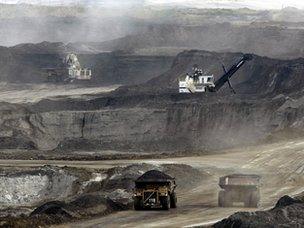Canada faces fight over oil sands
- Published

Canada's Northern Alberta contains massive petroleum reserves
Investment in Canada's oil sands is picking up after falling during the depths of the global economic recession. However, mounting environmental concerns threaten exports and Canada's next government will have a growing fight on its hands to promote the industry, as Jonah Engle reports.
April has been a difficult month for Canadian oil sands producers.
A few weeks ago, the Canadian government was forced to deny it was threatening the European Union with a trade dispute after a strongly worded letter by its trade representative to the EU was leaked.
The letter said the EU's plan to rate oil sands fuel as having a bigger carbon footprint than other sources, raised the prospect of "unjustified discrimination".
Meanwhile Canada's plan to expand its oil exports to the United States has been encountering growing resistance from politicians south of the border.
With progress stalled on a key Canada-US oil pipeline, US President Barack Obama angered the industry by using the politically sensitive term "tar sands", and said there were "some environmental questions about how destructive they are, potentially".
Regional to global
Oil sands is the name given to a very thick form of petroleum known as bitumen. Northern Alberta, in Canada contains the world's second largest petroleum reserves after Saudi Arabia's oil fields.
The mining of bitumen and its conversion into usable fuel require large amounts of energy which in turn produce green house gases.
Canada's current problems come with investment in its industry on the rise. In 2010 investment grew by $1.8bn - after a $7bn fall in 2009 - and further growth is anticipated this year.
However, industry experts say sustained investment will require the oil sands industry to expand from a regional to a global supplier.
The key project for growth in the US is TransCanada Corporation's $13 billion Keystone XL pipeline, which would deliver 1.1 million barrels of crude a day from Alberta, through six American states, to refineries on Texas' gulf coast.
But the project is not moving forward in the the way the industry had hoped.
Following President Obama's remarks, Alberta Energy Minister Ron Liepert retorted that Mr Obama, "should sign the bloody order" to commission the pipeline, even though it is not Mr Obama's decision to make - it lies in the hands of the State Department, which in March, decided to extend the review process on the line.

Oil sands will be a major issue for whoever leads Canada's next government
This is evidence of divided opinion within the Obama administration, says Danielle Droitsch of the Pembina institute, a Canadian environmental think tank.
"The agency that has had the most significant problems has been the Environmental Protection Agency," says Droitsch.
They are "not convinced that this pipeline is needed in the absence of making far more aggressive efforts to reduce America's oil dependence."
Opposition has been growing in Congress too, from Democrats who say expanding oil sands imports runs counter to reducing greenhouse gas emissions.
The massive Deepwater Horizon oil spill in the Gulf has not helped TransCanada Corporation either.
In Nebraska, one of the US states through which the proposed pipeline would travel, Republican Senator Mike Johanns wants the pipeline rerouted. This would significantly delay the project and increase costs, says Droitsch.
And, on top of the environmental opposition, Senator Ron Wyden of Oregon this month called on the Federal Trade Commission to launch an investigation alleging price fixing on the part of oil companies who would export fuel through the pipeline.
Action 'too late'
Dr Paul Chastko, and industry expert says Keystone, "reinforces our ties to …the only export market that we have for the oil sands".
Of even more importance is a proposed pipeline linking Alberta's oil sands to Canada's pacific coast, says Chastko.
"It brings with it the prospect of opening up new markets in China and India and the Pacific to really diversify our security of market."
But those plans remain stalled in part because of a moratorium on tanker traffic off the coast of northern British Columbia.
While energy policy and the oil sands have been absent from the debate in Canada's current federal election campaign, both national opposition parties, the Liberals and the New Democratic Party, have said they would keep the moratorium in place.
The ruling Conservative party, which has its political base in Alberta, would like to see the pipeline go ahead.
For economist Dr Frank Atkins of the University of Calgary, who is a proponent of oil sands development, some of the blame for the current impasse over expansion of exports lies with the government.
Two weeks ago, Alberta's Conservative government set aside one quarter of the oil sands for conservation.
The decision angered oil companies who have invested in production in this now closed off area. The government said it is sparing the industry the risk of further losses by responding to environmental concerns. But Atkins says the government has acted too late.
"We lost the public relations war over the last year or two," says Atkins. "The current administration made the mistake of just being silent for a long time on all of this, it was not a good plan."